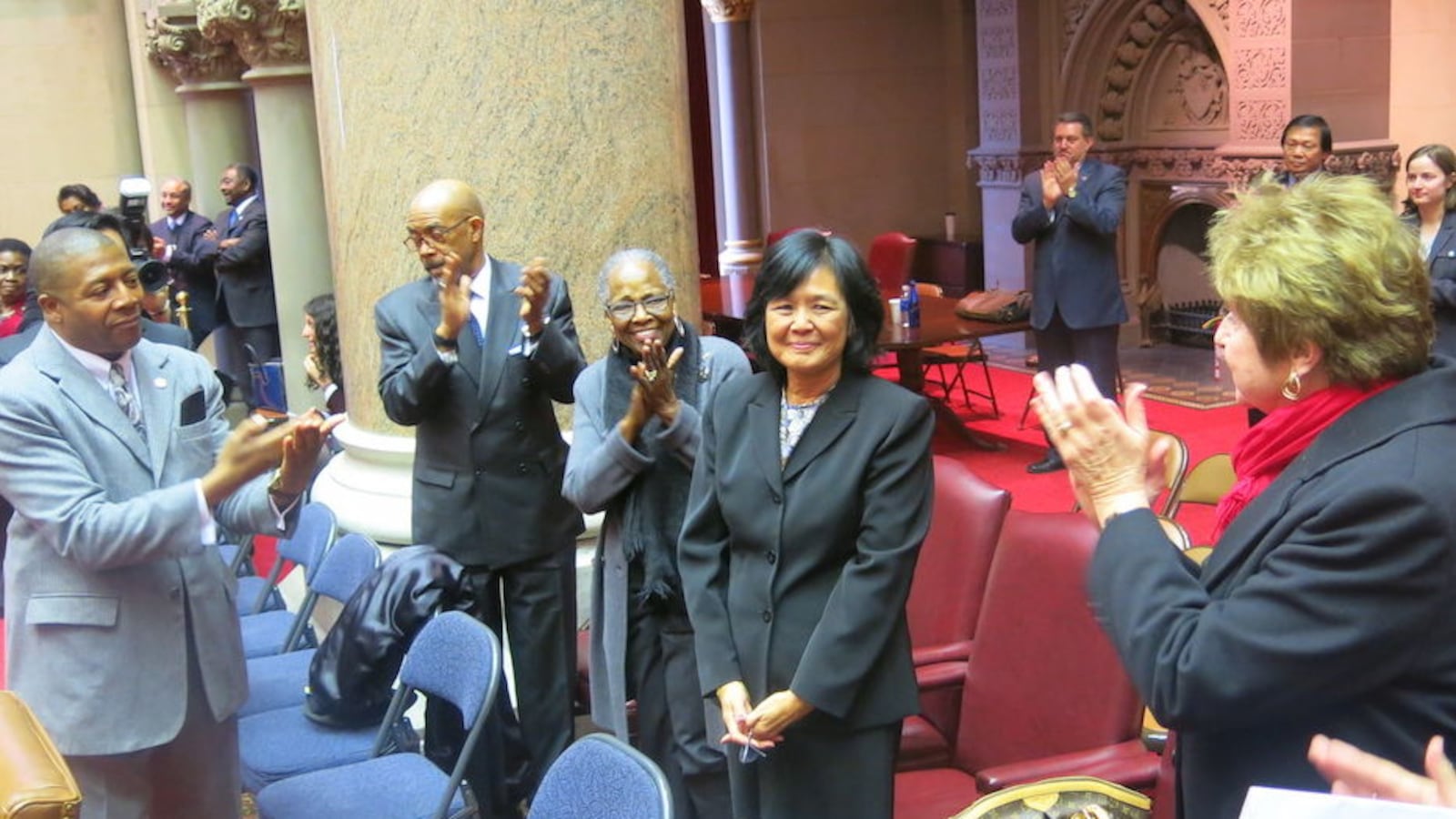Updated — As the state’s governing board of education enters a new phase, perhaps no one embodies its changes more than New York City’s newest representative, Judith Chin.
When Chin, born to Chinese immigrants, officially joins the Board of Regents next month, she’ll be the first Asian-American member in its 231-year history. She’s also one of nine women on a 17-member board, elected Tuesday, that is likely the most diverse it has ever been.
“That was quite significant, that I was making history,” Chin said after hearing the precedent announced by Assembly education committee chair Catherine Nolan shortly before lawmakers officially appointed her on Tuesday. “The fact that I’ll be a role model for so many immigrant children is something.”
Chin is part of other shifting dynamics, too.
After starting her career as a teacher in East Harlem in 1972, Chin rose to hold top positions under three chancellors, and she is now one of six Regents who are career educators. Her professional and personal experience as an English language learner “shaped how I look at children that come from different backgrounds,” she told lawmakers last month, as she recalled being one of the only minority students at her school in Midwood and not being able to speak English on her first day.
“I clawed at my father’s trousers hoping that he would never let me go,” said Chin, now a program director for the Reading and Writing Workshop at Teacher’s College.
Like other new Regents appointed on Tuesday, Chin said she has concerns about many of the changes made in recent years under board Chancellor Merryl Tisch and former Commissioners David Steiner and John King, especially the rollout of the Common Core standards. She called the state’s testing and evaluation policies a “gotcha game” and suggested charter schools are about profiting “on the backs of children and teachers.”
“I think just the vastness of it was probably not doable at all,” Chin said of the Common Core during her interview with lawmakers, contrasting the state’s implementation of those standards with her experience developing city-specific standards under former New York City Chancellor Rudy Crew.
Chin and three other new members are taking the reins at an uncertain moment. Regents are searching for a new commissioner to run the State Education Department, while sweeping changes to state education laws are being mulled by the legislature — policies that the Regents would be charged with implementing.
She is also part of a reshuffling that reflects a larger power struggle over education policy at the state level.
Also joining the board are Catherine Collins of Buffalo, and Beverly Ouderkirk of upstate New York, both of whom successfully challenged incumbents who supported Tisch’s policy stewardship. Last year, another Regent stepped down under similar circumstances.
Chin replaces Geraldine Chapey, who resigned voluntarily last year. Judith Johnson, of Westchester, was appointed to replace Harry Phillips, who announced his plans to step down months ago when his term expires in April. (Two incumbent Regents from New York City, Kathleen Cashin and Lester Young, were reappointed on Tuesday.)
There has been growing dissent surrounding the education policy changes enacted in recent years, most notably from the state teachers union. New teacher evaluation systems tied to test scores, adoption of the Common Core learning standards and tougher teacher preparation requirements for prospective teachers were all pushed with $700 million in Race to the Top funding over the last half-decade, and the polices have drawn fierce opposition. The Democrat-controlled Assembly has addressed that dissent through the Regents selection process, which it controls.
“Do I see these replacements as a reaction to what people are hearing in their home district? Absolutely,” Tisch told reporters after the vote. “A lot is frustration. A lot is misinformation.”
After her stint in East Harlem, Chin taught at a school in Crown Heights before becoming the principal of schools in Chinatown and Chelsea. More recently, she served as a superintendent and network leader under Joel Klein, helping to open one of Queens’ first small high schools in 2004, Flushing International High School.
“She knew who those students were, she understood who English language learners were and she understood why a school like ours would be so helpful to them,” said Claire Sylvan, of the Internationals Network for Public Schools, which includes Flushing International.
And though Chin said she supported giving parents more school options, she is skeptical about whether charter schools are the answer. She questioned whether they were performing well enough, even though they aren’t “playing on the same fair playing field” as district schools.
“I also wonder if charter schools are more towards gaining organizational profit off the backs of children and teachers,” she said in her interview.
The New York State United Teachers, which has often sparred with King and Tisch over the years, called the new members an “opportunity for a fresh start and the Regents to begin rebuilding trust.”
But Cashin, who is completing her first five-year term as Brooklyn Regent, wasn’t ready to say that the new members marked a sea change, yet.
“I don’t know yet if this moment is going to really generate change,” said Cashin. “We’ll have to wait and see.”

